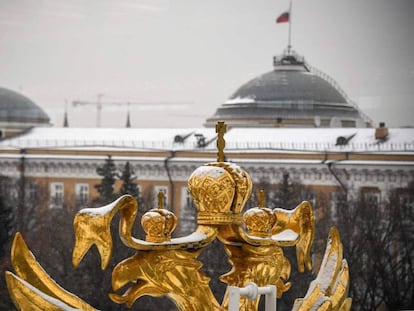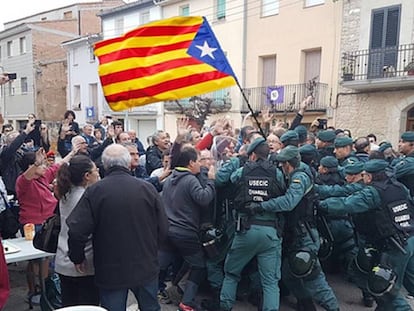“Putin’s goal is for Europeans to lose faith in their democratic institutions”
Russian journalist Andrei Soldatov, an expert on security and intelligence issues, talked to EL PAIS about the disinformation campaigns against the West


Russian president Vladímir Putin has a goal: to make Europeans lose faith in their democratic institutions, according to investigative journalist Andrei Soldatov, who specializes in Russian security services and Kremlin-sponsored disinformation campaigns aimed at sowing discord in the West through bots, trolls and fake news.
Soldatov, who is a regular commentator on security issues for Western media like the BBC and Radio Free Europe, talked to EL PAÍS during a break from a busy agenda of talks and panel discussions at the Internet Freedom Festival, which was held in Valencia from March 5th to 9th. The interview took place before Vladimir Putin cruised to re-election on March 18.
At 42, Soldatov is the co-founder and editor of the Russian media project Agentura and the author of several books on security and intelligence issues in his home country. This security expert says that Putin first used a disinformation campaign in Russia, and scored his first big international success during the war that ended with the annexation of Crimea in 2014. Since then, Moscow has been expanding its activities towards the West. These activities include meddling with the Brexit referendum, with the US presidential elections, and with the secessionist crisis in Catalonia, as EL PAÍS has reported.
Since the annexation of Crimea in 2014, Moscow has been expanding its activities towards the West
“The goal of the campaign is not to convince you of anything – say, that Catalonia should be independent,” said Soldatov. “Its real aim is to get everyone confused and make you distrust your democratic institutions. So they can disseminate all kinds of crazy stories, because the point is not to get people to believe them, but to get everyone confused.”
This intoxication campaign first bore fruit in Russia. “Today, in my country, nobody trusts the Parliament, or opposition leaders, or journalists. And that helps Putin exercise control, because when you have such a confused society, the people have nothing left but the strong leader, with nothing in between.”
At the Valencia event, the speakers from China and Iran, who also reported that authorities in their countries are seriously constraining online freedom, no longer live in their home countries. But Soldatov still lives in Russia.
“Being a journalist in Russia is pretty risky, but I believe that there are still many things that we can do. For instance, the best recent features about the troll farms used to interfere in the West were written by Russian journalists working in Russia. It’s not just me; there are lots of journalists out there doing their job.”
The point is not to get people to believe them, but to get everyone confused Andrei Soldatov
Soldatov says that these fake news factories – whose activity during the US election campaign led the US Justice Department to indict 13 Russian citizens and three business – emerged years ago as a result of a decision by the Kremlin to “externalize sensitive operations on the internet.”
The people who disseminate fake news are not part of the Russian intelligence and security services, and they don’t belong to the Army either, and this allows to Kremlin to deny any direct responsibility for their activities. Yet they are overseen by people with very close ties to the Kremlin, they enjoy generous funding, they have hundreds of employees, and they are organized into departments focusing on various parts of the world, notes Soldatov.
They have also learned from their mistakes. “When the troll farms began operating around 2014, they were not very successful. They were employing people with poor language skills and making big mistakes, and this made export difficult. But they have improved a lot with time.”
Soldatov attributes the origin of the global-scale manipulation campaign to the fact that Putin sees his country as “a fortress under siege by the West.” But he underscores that the first digital victims of the Russian president were his own citizens and the once-flourishing internet industry. “Practically no other country in the world was able to create companies that could compete in their markets with Google and Facebook, but Yandex and VKontakte managed it,” he says.
According to Soldatov, Putin has been armwrestling the tech companies through a policy of “fear and intimidation” coupled with “very repressive legislation that puts all companies in a situation of insecurity.” And when the Kremlin encounters resistance, it resorts to dramatic measures: Pavel Durov, the founder of the social media network VKontakte, was “forced to leave the company and the country.”
The first digital victims of the Russian president were his own citizens and the once-flourishing internet industry
Large US corporations such as Google, Facebook and Twitter are also being targeted by the Russian president, says Soldatov. “For now they have refused to take their servers to Russia, which is a good thing, because it means that Russian security services cannot access them. Sometimes they will yield and remove a post or a video on the Russian government’s request, but they are trying to resist the pressure.”
The prospects are not so good for the Dubai-based online messaging service Telegram, which has been told to hand over its encryption codes to the Federal Security Service (FSB, heir to the KGB). So far, the most popular messaging service in Russia – also founded by Pavel Durov and his brother – is refusing to comply and has turned to the courts for help.
English version by Susana Urra.









































